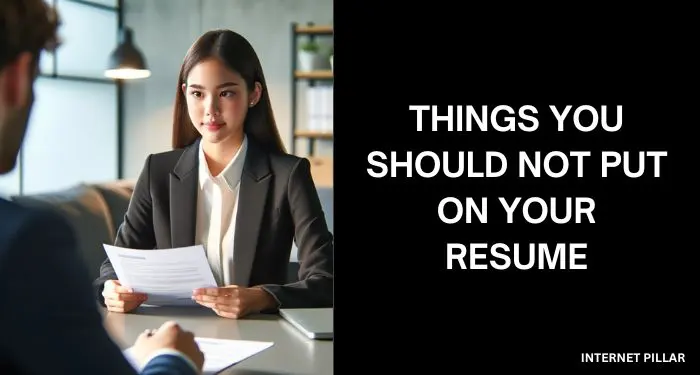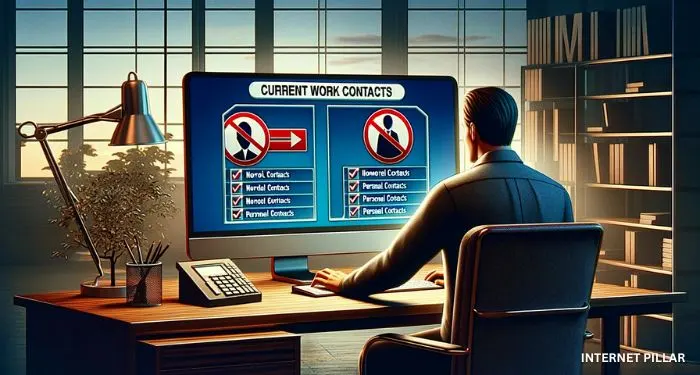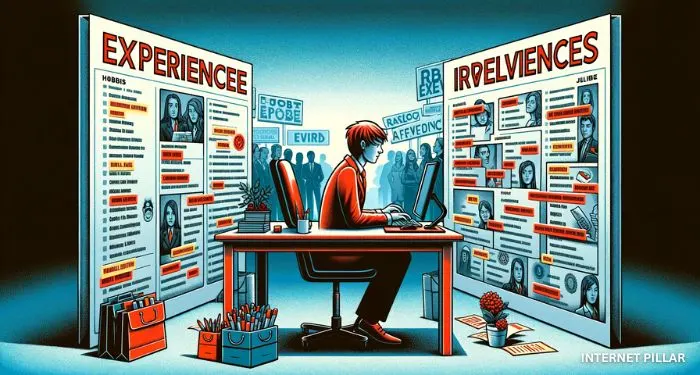The job market is tough and each open position gets around 250 applications.
Most big companies use Applicant Tracking Systems (ATS) to filter out less qualified candidates.
If your resume beats these systems it still has to impress the recruiter or hiring manager who typically glances at it for just six seconds.
To pass this quick review your resume should avoid unnecessary details and focus on what’s important for the company.
Remember including the wrong stuff can lead you to be disqualified early.
Employers want to narrow down candidates quickly so they look for reasons to reject applications.

Make sure your resume shows you’re motivated and qualified focusing only on relevant information.
Remember for every job opening many applicants feel it’s their dream job.
It’s important to stand out but not by overloading your resume with too much info. Usually a one-page resume is best filled with only pertinent details.
Knowing what not to put on your resume helps you create a focused and effective application increasing your chances of getting hired.
Let’s get started.
15 Things You Should Not Put on your Resume
1. Replace Objective with Professional Summary
Swap out your resume’s objective statement with a professional summary.
Generic objective statements don’t clarify what job you’re seeking or why you’re the right fit.
Instead use a 3-5 line professional summary to deliver your elevator pitch highlighting your qualifications and career achievements.
This approach is more effective than an objective statement which merely expresses a desire for employment.
Reserve an objective only for specific situations like recent graduation or career shifts.
Overall a resume summary showcases your readiness for the job with your skills and experience.
2. Personal Email Address
Inappropriate or humorous email addresses like “[email protected]” or family shared emails are not suitable for job applications.
Instead create a professional email ideally using your name and credentials such as “[email protected].”
Maintain separate email addresses for personal and professional use.
An email that aligns with your professional identity ensures you’re taken seriously and helps you stay organized in your job search.
3. Non-Active Social Media Profiles
Only include social media links on your resume if they are professional support your job goals and are regularly updated.
Make sure these profiles reflect your personal brand and qualifications.
Furthermore have at least one professional online profile like LinkedIn or GitHub and consider a mobile-responsive online portfolio or blog for creative fields.

Irrelevant or unprofessional social media accounts should be omitted from your resume.
4. Personal Details to Exclude
Avoid including personal information like your social security number marital status sexual orientation or religious beliefs on your resume.
It’s illegal for employers to base hiring decisions on these details.
Only include information relevant to the job. Unnecessary details like height weight age political affiliations or unrelated hobbies should be left out.
The focus should be on your professional qualifications. Remember employers only need your name city state and contact information.
Keep it professional and relevant to avoid appearing unprepared for the job market.
5. Avoid Spelling and Grammatical Errors
Spelling and grammatical errors are the top resume mistakes that can cost you a job.
To avoid these errors print your resume in a different font read it aloud and have someone skilled in writing review it.
Use editing software for initial checks then read your resume from bottom to top for a fresh perspective.

A trusted person’s review can also be invaluable for catching mistakes and confusing elements.
6. Salary History
Don’t include your current or past salary on your resume.
Revealing these details can lead to being low-balled or dismissed for dishonesty since April 2018 several U.S. locations have banned employers from asking for salary history.
Salary discussions should occur during interviews or job offers not on your resume.
Including salary information is seen as tactless and can negatively impact hiring decisions.
7. Exclude References
There’s no need to list references or state “References available upon request” on your resume.
This information is unnecessary at the application stage and wastes valuable space.
Employers expect you to provide references when they ask for them.
Keep your references on a separate document and provide them only upon request.
8. High School Information Is Unnecessary
For recent college graduates or those with higher education high school information is not needed on your resume.
Focus on higher education achievements like college degrees trade school certifications or college coursework.
High school details are irrelevant for most job applications and should be omitted to make room for more pertinent educational experiences.
9. Your Age
Avoid revealing your age indirectly on your resume.
This includes omitting graduation dates and not listing job experiences over 30 years old.
Age discrimination is illegal but can still occur.
Review your resume for any hints of your age especially if ageism could be a barrier in your job search.
10. Exact Street Address
It’s no longer necessary to include your full home address on your resume.
If location is relevant to the job simply include your city state and zip code.
Leaving out your street address also helps protect against identity theft.
This is particularly relevant for remote job applications.
11. Avoid Current Work Contacts
Don’t use your current job’s contact details like work email or phone number on your resume.
This can lead to uncomfortable situations potential breaches of company policy and even job termination. Instead you should use personal contact information.

Also don’t list your current employer’s name unless you’re comfortable with them being contacted by potential employers.
12. Use Relevant Hobbies Only
Generally hobbies and interests don’t belong on your resume unless they are directly relevant to the job you’re applying for.
For instance mention a cooking hobby if applying for a social media role at a restaurant.
Otherwise leave hobbies off to keep the focus on your professional qualifications.
13. Long Paragraphs
Employers often skim resumes so avoid long paragraphs.
A resume should be easy to read and understand. Use bullet points to make your qualifications stand out clearly.
Lengthy job descriptions can lose the employer’s attention so focus on concise impactful statements in your experience section.
14. Irrelevant Experiences
Your resume should emphasize qualifications relevant to the job.
Don’t list every job you’ve ever had; limit your history to the last 10–15 years unless an older job directly relates to the position.
Exclude experiences that don’t contribute to your job application except to avoid employment gaps.
For long tenures at one company with multiple roles detail recent positions and briefly list earlier ones without descriptions.

This approach optimizes space while maintaining a complete employment history.
15. Complex Formatting
Maintain a consistent format throughout your resume to make it easy for employers to find key information.
Avoid unnecessary elements like headers footers tables images or charts as they can be distracting and may not be compatible with applicant tracking systems (ATS).
Use a simple professional font and keep bullet points concise ideally not exceeding one line.
This approach ensures readability and ATS compatibility.
For jobs requiring detailed descriptions like academic or executive roles slightly longer explanations are acceptable but still keep them as brief as possible.
All the best for your upcoming interview.